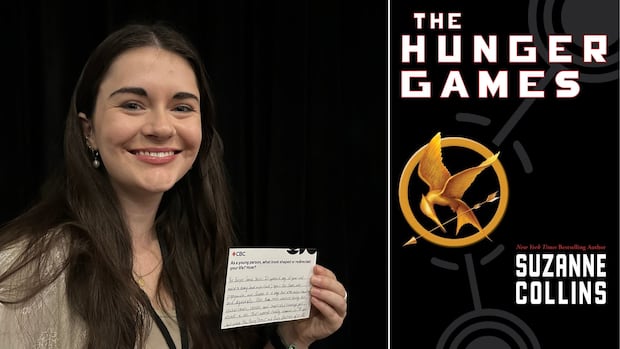Ask a room full of bookworms what book changed their life when they were young, and you’ll get pensive expressions. Then, their faces light up.
Daybreak Alberta asked that question during a live show in Calgary’s Memorial Park Library on Sunday as part of the annual literary festival Wordfest. We got dozens of responses about how certain books made people ask questions, find courage and comfort.
Ellen Story Pegg’s pick was a simple children’s picture book: Pierre Bear by Patricia Scarry. It means so much, it still has a place on the 70-year-old’s bookshelf.
She grew up in the “outback” near Borden, Sask. — just her and her parents. She was just beginning to feel like her life was different from everyone else’s when she got Pierre Bear, which tells the story of a young bear (dressed and talking like a human) who lives in the bush with his parents, just like her.
“Books let you know somebody else has experienced your experiences and that you’re OK. You’re not abnormal — other people live that way,” she said. “And like Pierre Bear, we lived out in the middle of nowhere.”
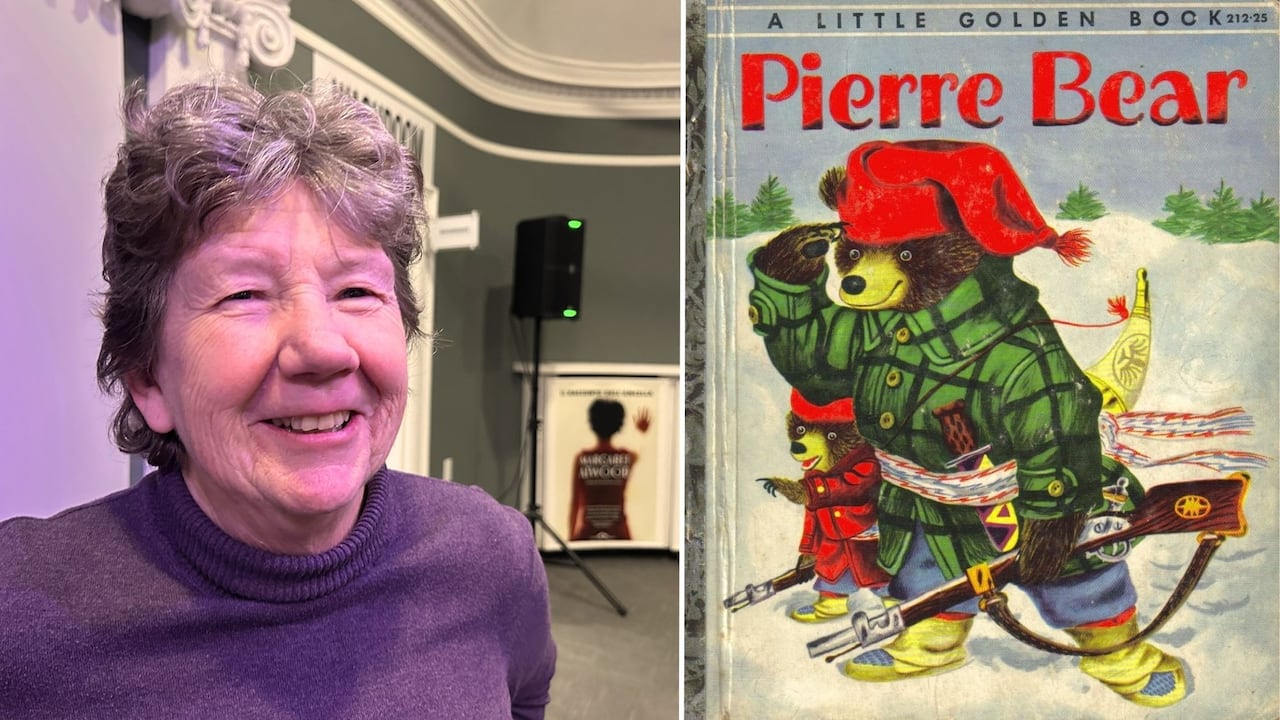 Ellen Story Pegg says her first book was the picture book Pierre Bear. It gave her comfort. (Elise Stolte/CBC)
Ellen Story Pegg says her first book was the picture book Pierre Bear. It gave her comfort. (Elise Stolte/CBC)
Daybreak Alberta host Paul Karchut interviewed a series of Canadian authors on Sunday, including David A. Robertson and Cherie Dimaline, two of the authors who contributed to the book You Were Made for This World.
That project saw 40 Indigenous writers, artists, activists, athletes, scholars and thinkers come together to celebrate young people.
LISTEN | David A Robertson and Cherie Dimaline join Daybreak Alberta:
Daybreak Alberta10:31Indigenous thinkers send a message to the youth in new book of essays
We’re joined by Cherie Dimaline and David A Robertson, two of the authors who wrote essays for this book. It’s called You Were Madefor this World”. We talk about their message to the youth, book bans for kids and writing through dark times in the world. They join us on the Wordfest stage.
Both Dimaline and Robertson’s stories for the collection are about anxiety.
“We grew up as really anxious kids and didn’t have books that named it, that talked about it and that let you know that you weren’t alone,” said Dimaline.
“We have a lot of conversations about: what can we put out there in the world for young people … that we would have loved to have?”
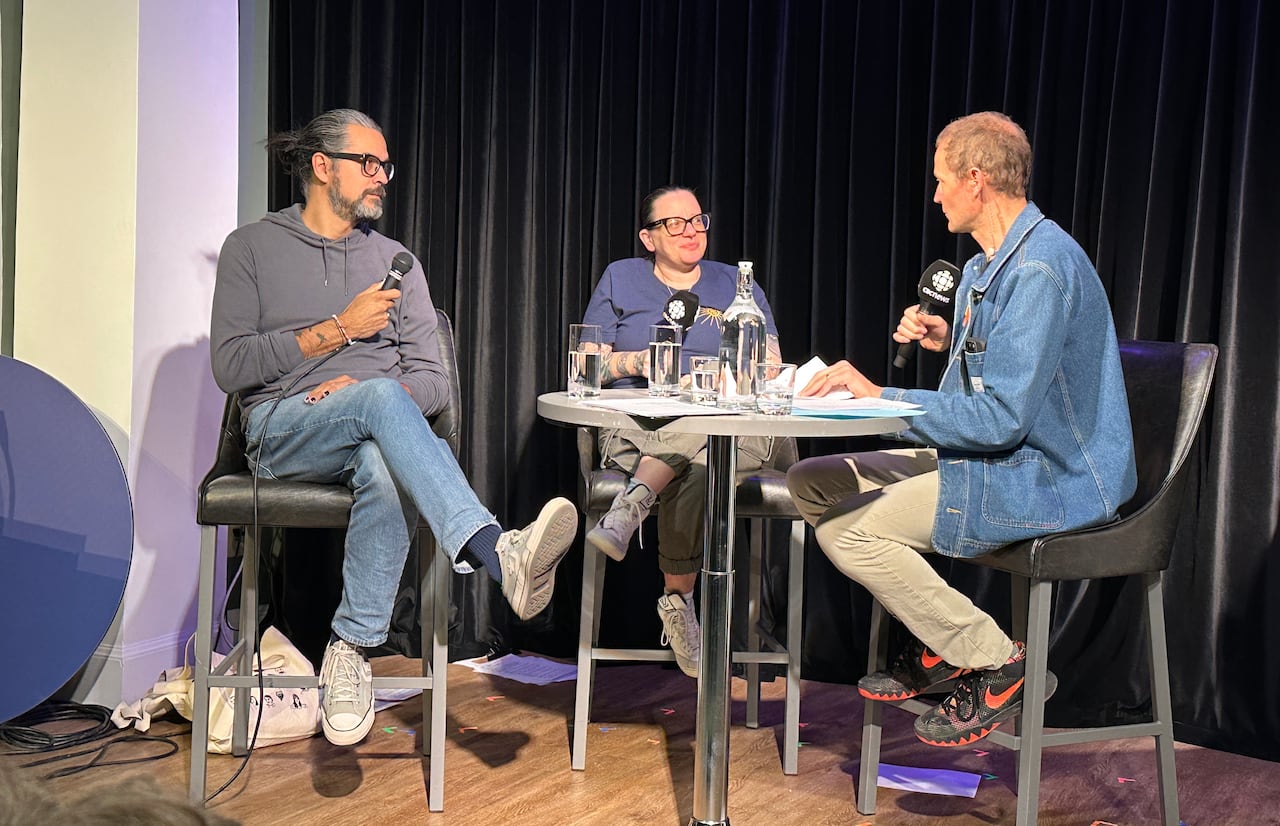 David A. Robertson, left, and Cherie Dimaline, two of the authors who contributed to the book You Were Made for This World, speak with Daybreak Alberta’s Paul Karchut at Wordfest. (Elise Stolte/CBC)
David A. Robertson, left, and Cherie Dimaline, two of the authors who contributed to the book You Were Made for This World, speak with Daybreak Alberta’s Paul Karchut at Wordfest. (Elise Stolte/CBC)
Dimaline, a writer from the Georgian Bay Métis community, wrote a book, The Marrow Thieves, which was challenged by a parent as “anti-Catholic” in one U.S. state and removed from library shelves in another. Robertson also had his book, The Great Bear, temporarily removed from shelves by a school board in Ontario.
“You write books for teachers to use in classrooms – at least I do. When you take those resources away, you’re taking away an avenue for kids to access truth. And I think the most effective thing that we can do is to arm children with knowledge,” said Robertson.
“Knowledge comes from stories, and if you want to prepare kids to do better than we’ve done, you have to give them access to truth. … I think that we need to fight for our kids’ right to access literature.”
Book bans were also on Allison McCaffrey’s mind because of Alberta’s recent debate over sexual content in school libraries.
Judy Blume’s Are You There God? It’s Me, Margaret has been banned in various jurisdictions over the years because of its frank discussion of sexuality. But that was a formative book for McCaffrey, who said she used to sneak books home from the library when she didn’t think her parents would approve.
“I learned all about puberty from Are You There God?”
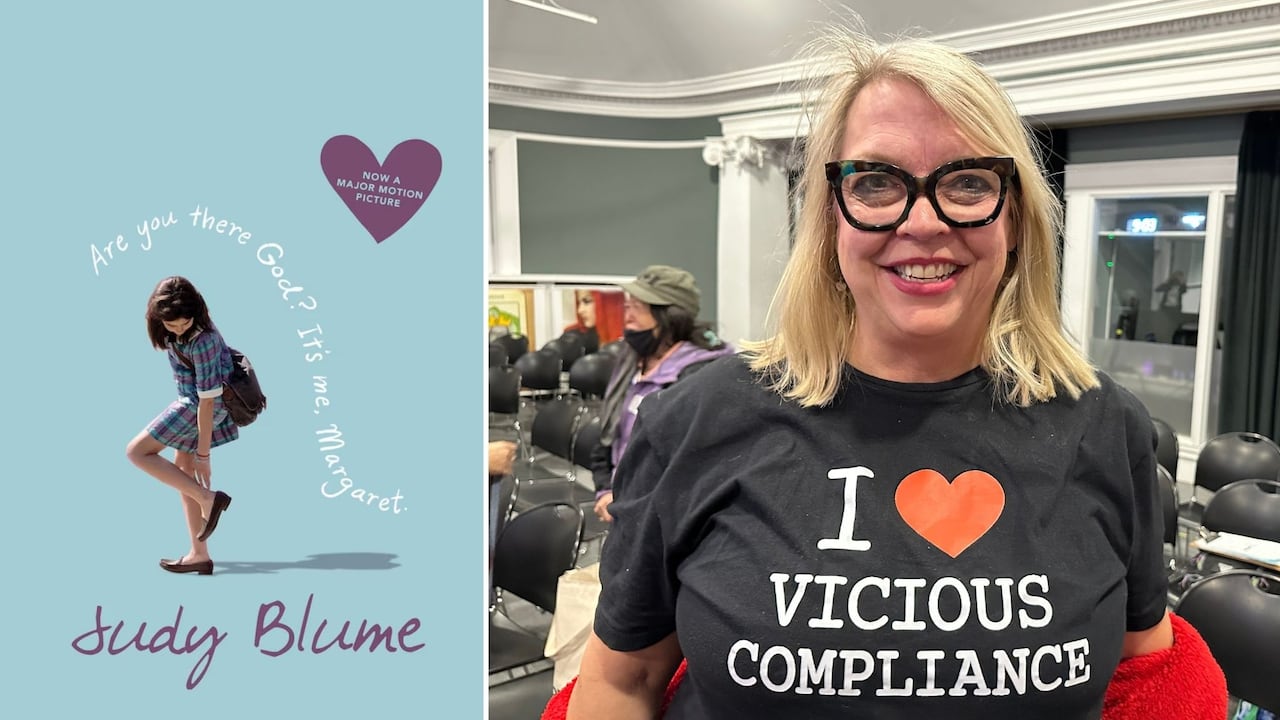 Allison McCaffrey says Judy Blume’s book ‘Are You There God? It’s Me, Margaret’ taught her all about puberty when she was a child. (Elise Stolte/CBC)
Allison McCaffrey says Judy Blume’s book ‘Are You There God? It’s Me, Margaret’ taught her all about puberty when she was a child. (Elise Stolte/CBC)
Many people volunteered less controversial titles as books that shaped their lives.
The stories that Bing So remembers are the ones that helped him understand Canada.
As a young boy from Hong Kong growing up in Calgary, he loved Farley Mowat’s Lost in the Barrens, about two teenagers who get separated from a hunting party and survive the winter on their own above the tree-line.
“But the two most influential books of my youth are the Webster’s Dictionary, which expanded my learning of English, and the CAA guide[s] to road travel across Canada, which inspired me to travel our great country.”
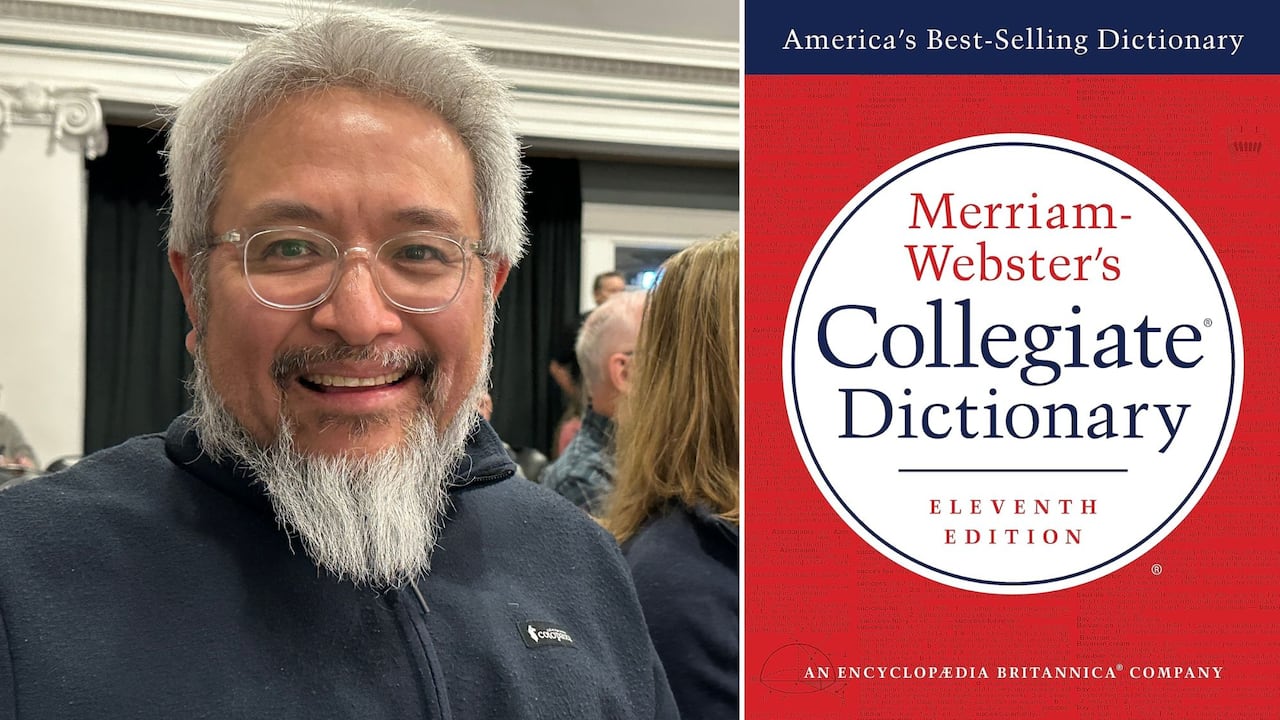 Bing So says he spent hours reading copies of the dictionary and CAA route guides, both of which helped him settle as a young boy in this country. (Elise Stolte/CBC)
Bing So says he spent hours reading copies of the dictionary and CAA route guides, both of which helped him settle as a young boy in this country. (Elise Stolte/CBC)
For several people, the titles they remember most ended up being gateways: books that helped them realize they actually can read and led to a life full of literature.
For Trish Lovstrom that was Nineteen Eighty-Four by George Orwell. Dyslexia meant she wasn’t much of a reader but, she wrote on a postcard that CBC distributed to invite audience members to share their thoughts. But that book opened her eyes to an amazing world of reading and “that I actually could read.”
Warren LaFountain’s pick was The Cay by Theodore Taylor. It’s a short novel about a young boy and a man shipwrecked on an island during WWII.
“I struggled to read as a kid, like, getting into a book. It’s short. It got me into it quick and now I’m reading 1,100-page books. I don’t think I would have gotten there if I had started off with Dune and Lord of the Rings,” he said.
“[The Cay] starts off with adventure and then it ends … a spoiler, but it’s a 56-year-old book … he sacrifices himself to save the boy. And it taught me, sort of, service above self and that we’re all in this together.”
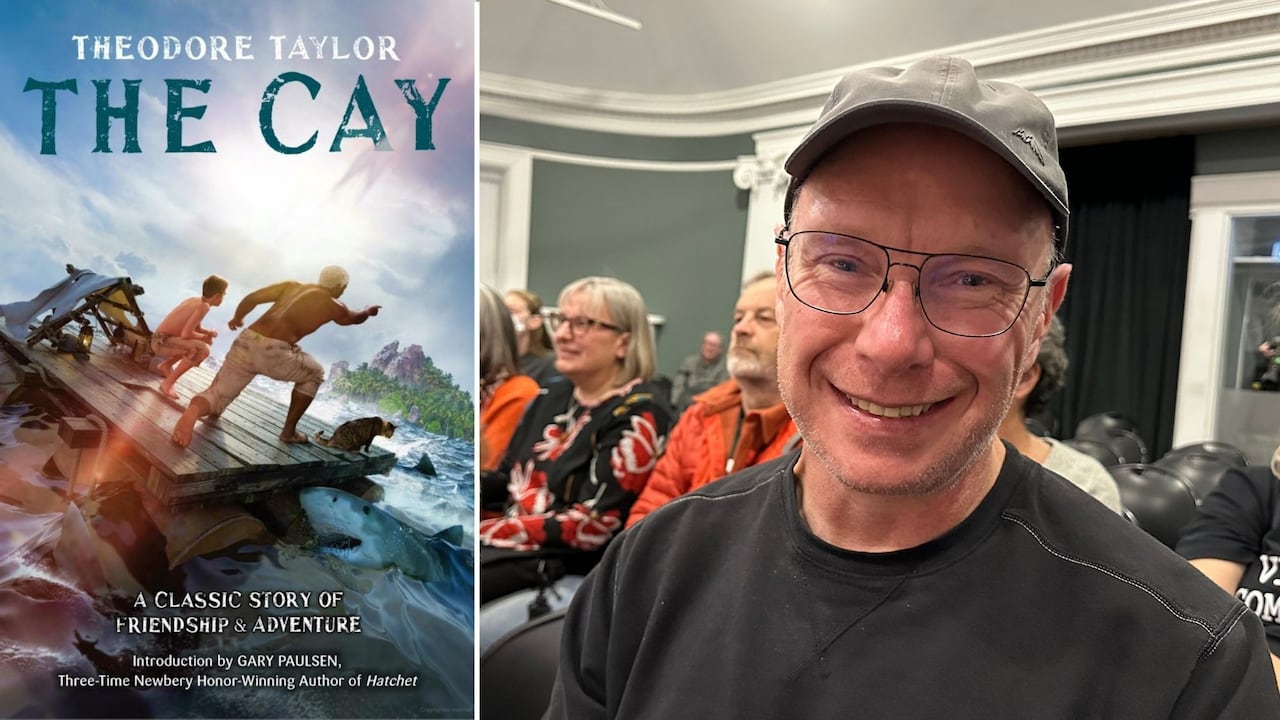 Warren LaFountain says The Cay was his gateway into the world of books. (Elise Stolte/CBC)
Warren LaFountain says The Cay was his gateway into the world of books. (Elise Stolte/CBC)
We also heard about books that challenged readers to think more deeply and even shaped their future careers.
Kendall Bistretzan said the book that most shaped her life was The Hunger Games.
“It opened my 12-year-old mind to heavy [and important] topics like class, war, propaganda and fascism in a way that was understandable and digestible. Also, the main character being this uncharismatic, capable and complicated teenage girl meant a lot.”
Jeanne Phene was listening on Sunday morning. She left a message for Daybreak Alberta to say the book that shaped her life was Mary Anning’s Treasure by Helen Bush, about a young fossil hunter who finds a dinosaur.
That book launched Phene into a lifelong love of fossils and a 35-year career as an engineer in oil and gas.
Erik Ashworth left a message about Laura Hillenbrand’s Unbroken, a story of Louis Zamperini, a former Olympic track star who survived a plane crash during World War II, spent 47 days on a life raft, and then two and a half years as a prisoner of war in Japan.
Ashworth was in his late 20s when he read the book, and it touched him deeply. It was eye-opening for him. At the same time, he realized the traumatic experiences during the war were nothing special in the grand scheme of human history, he said, and these conflicts continue today, he said.
“In Canada, North America, we’re just super lucky to be born here. We need to really nurture that and not take it for granted.”
What book shaped you?
Host Paul Karchut still wants to know and will feature more of these stories on Daybreak Alberta the weekend of Oct. 25 and 26.
Leave a message by clicking on the “play button” on the video below. After you record a message, you can leave us your name and click the box to confirm we can share your note on air.
Everyone who leaves a note about their book will be entered in a draw to win some of the books featured at Wordfest. You can also email Paul at daybreak@cbc.ca.

